 W
WJoshua Babcock (1707–1783) was a physician, American Revolution general, Rhode Island Supreme Court justice, and postmaster from Westerly, Rhode Island.
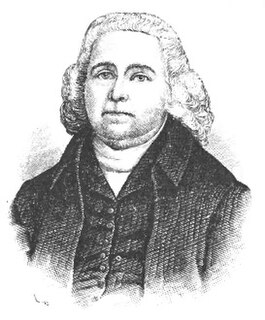 W
WIsaac Backus was a leading Baptist minister during the era of the American Revolution who campaigned against state-established churches in New England.
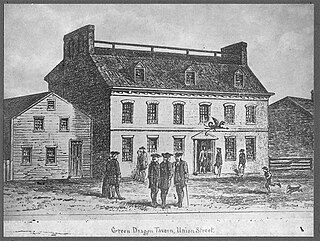 W
WThe Boston Caucus was an informal political organization that had considerable influence in Boston in the years before and after the American Revolution. This was perhaps the first use of the word caucus to mean a meeting of members of a movement or political party to agree on a common position.
 W
WJames Bowdoin III was an American philanthropist and statesman from Boston, Massachusetts. He has born to James Bowdoin in Boston, and graduated from Harvard College in 1771. James then studied law at Oxford and traveled widely in Europe until 1775. When he got the news of the Battle of Lexington he returned home. He served in the Massachusetts state legislature and on the council before attending the Massachusetts’ constitutional convention in 1779 and 1780.
 W
WJohn Brown I was an American merchant, enslaver, slave trader and statesman from Providence, Rhode Island. Together with his brothers Nicholas, Joseph and Moses, John was instrumental in founding Brown University and moving it to their family's former land in Providence. John Brown laid the cornerstone of the university's oldest building in 1770, and he served as its treasurer for 21 years. Brown was one of the founders of Providence Bank and became its first president in 1791. He was active in the American Revolution, notably as an instigator of the 1772 Gaspee Affair, and he served in both state and national government. At the same time, he was a powerful defender of enslaving Blacks, clashing aggressively—in newspapers, courts and politics—with his brother Moses, who had become an abolitionist.
 W
WBenjamin Bussey (1757—1842) was a prosperous merchant, farmer, horticulturalist and patriot in Boston, Massachusetts, United States, who made significant contributions to the creation of the Arnold Arboretum. He was said to be "a man of excellent business capacity."
 W
WGeorge Claghorn was an American patriot and shipwright. He served as an officer in the American Revolutionary War and was wounded in the Battle of Bunker Hill. After the war, he was awarded the rank of colonel in the Massachusetts militia. Claghorn was the master shipbuilder of Old Ironsides, which he and Samuel Nicholson built for the early United States Navy during the years 1794–1797. Old Ironsides is the oldest naval vessel in the world that is still commissioned, afloat and seaworthy.
 W
WSamuel Cutts was an American merchant and politician.
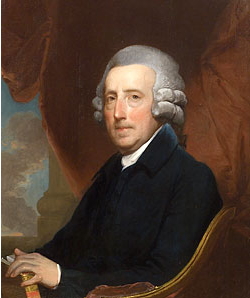 W
WThomas Dawes was a Patriot who served as a Massachusetts militia colonel during the American Revolution and afterward assumed prominent positions in Massachusetts's government. His positions included membership and chairmanship of the Massachusetts Governor's Council and representative in both the House and Senate. As chairman of the Governor's Council, Dawes served briefly as the de jure presiding officer of the executive branch of Massachusetts' state government for ten days – May 20, 1800 to May 30, 1800 – following the death of first Governor Increase Sumner and then Lieutenant Governor Moses Gill.
 W
WEarly American publishers and printers played an integral role in the social, political and commercial developments in colonial America before, during and after the American Revolution. Printing and publishing in the 17th and 18th century among the Thirteen Colonies of British North America emerged in the face of various pressing needs and political development that were widely considered among those settlements as unfair rule over them by the British Crown.
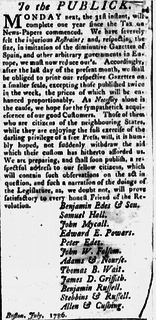 W
WBenjamin Edes was a journalist newspaper publisher and revolutionary advocate before and during the American Revolution. He is best known, along with John Gill, as the publisher of the Boston Gazette, a colonial newspaper which sparked and financed the Boston Tea Party and was influential during the American Revolutionary War.
 W
WEnoch Edwards was an American physician and a leading Patriot during the American Revolution. Born in Byberry Township, Pennsylvania, Edwards was a member of the Provincial Congress in Carpenters' Hall on June 18, 1776, which led to the Pennsylvania Constitution of 1776. He was also a signatory of the 1790 Pennsylvania Constitution. During the war he served as attending physician for George Washington, was a close friend of both Benjamin Rush and Thomas Jefferson, and kept up correspondence with James Monroe and John Quincy Adams.
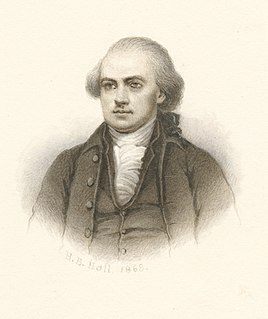 W
WWilliam Ellery was a signer of the United States Declaration of Independence as a representative of Rhode Island. In 1764, the Baptists consulted with Ellery and Congregationalist Reverend Ezra Stiles on writing a charter for the college that became Brown University. Ellery and Stiles attempted to give control of the college to the Congregationalists, but the Baptists withdrew the petition until it was rewritten to assure Baptist control. Neither Ellery nor Stiles accepted appointment to the reserved Congregationalist seats on the board of trustees.
 W
WWilliam Eustis was an early American physician, politician, and statesman from Massachusetts. Trained in medicine, he served as a military surgeon during the American Revolutionary War, notably at the Battle of Bunker Hill. He resumed medical practice after the war, but soon entered politics.
 W
WDavid Forman was born in Monmouth County, New Jersey of parents Joseph Forman and Elizabeth Lee. His father was a wealthy shipowner and he was educated at Princeton. At the start of the American Revolutionary War he rallied to the patriot cause and was appointed lieutenant colonel of a New Jersey state regiment. When his commander assumed command of the brigade, he was promoted colonel of the regiment during the New York and New Jersey Campaign in 1776. At the time of the battles of Trenton and Princeton Forman's regiment waged a merciless war against the American Loyalists of Monmouth County. Then and later he became known as "Devil David" for his zeal in suppressing the local Tories. In January 1777, the Continental Congress authorized him to raise Forman's Additional Continental Regiment with the rank of colonel in the Continental Army.
 W
WTheodore Foster was an American lawyer and politician from Rhode Island. He was a member of the Federalist Party and later the National Republican Party. He served as one of the first two United States senators from Rhode Island and, following John Langdon, served as dean of the Senate.
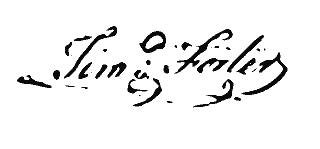 W
WTimothy Foster and his family were the first colonial settlers of Winthrop, Maine. He was a captain in the Massachusetts militia during the American Revolutionary War.
 W
WThe Founding Fathers of the United States, or simply the Founding Fathers or Founders, were a group of American revolutionary leaders who united the Thirteen Colonies, led the war for independence from Great Britain, and built a frame of government for the new United States of America upon classical liberalism and republican principles during the latter decades of the 18th century.
 W
WWilliam Temple Franklin Jr, known as Temple Franklin, was an American diplomat and real estate speculator. He is best known for his involvement with the American diplomatic mission in France during the American Revolutionary War. Beginning at the age of 16, he served as secretary to his grandfather Benjamin Franklin, who negotiated and agreed to the Franco-American Alliance.
 W
WFather Pierre Gibault was a Jesuit missionary and priest in the Northwest Territory in the 18th century, and an American Patriot during the American Revolution.
 W
WWilliam Goddard was an early American patriot, publisher, printer and postal inspector. He was born in New London, Connecticut and lived through the American Revolution era. He was a staunch anti-imperialist and an ardent defender of the fundamental American ideals of freedom of the press and speech. Goddard served as an apprentice printer under James Parker and in 1762 became an early American publisher who eventually established four newspapers during the American colonial period. For a short time he was also a postmaster of Providence, Rhode Island. Later his newspaper partnership with Benjamin Franklin in Philadelphia would play an important role in the development of Franklin's ideas for a postal system in the soon to be united colonies. Goddard's association with Franklin while he was serving as the Postmaster in Philadelphia played an important role when they were introducing many of the reforms and improvements needed in the colonial postal system currently in use.
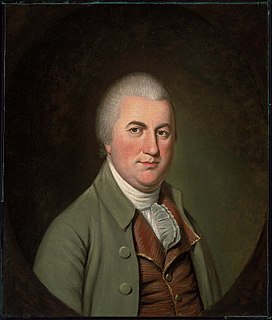 W
WNathaniel Gorham, his first name is sometimes spelled Nathanial) was a politician and merchant from Massachusetts. He was a delegate from Massachusetts to the Continental Congress and for six months served as the presiding officer of that body. He also attended the Constitutional Convention, served on its Committee of Detail, and was one of the signers of the United States Constitution.
 W
WNancy Morgan Hart was a rebel heroine of the American Revolutionary War noted for her exploits against Loyalists in the northeast Georgia backcountry. She is characterized as a tough, resourceful frontier woman who repeatedly outsmarted Tory soldiers, and killed some outright. Stories about her are mostly unsupported by contemporary documentation, and it has been impossible for researchers to entirely distinguish fact from folklore.
 W
WMichael Hillegas was the first Treasurer of the United States.
 W
WStephen Hopkins was a governor of the Colony of Rhode Island and Providence Plantations, a Chief Justice of the Rhode Island Supreme Court, and a signer of the Declaration of Independence. He was from a prominent Rhode Island family, the grandson of William Hopkins who served the colony for 40 years as Deputy, Assistant, Speaker of the House of Deputies, and Major. His great grandfather Thomas Hopkins was an original settler of Providence Plantation, sailing from England in 1635 with his cousin Benedict Arnold who became the first governor of the Rhode Island colony under the Royal Charter of 1663.
 W
WJoshua "Jack" Huddy, the commander of a New Jersey Patriot militia unit and a privateer ship during the American Revolutionary War, was noted as a figure of controversy after he was executed by irregular forces of the Associated Loyalists. He had been twice captured by Loyalist forces, escaping after the first time.
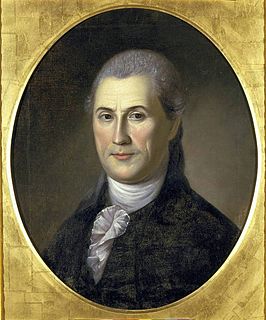 W
WSamuel Huntington was a jurist, statesman, and Patriot in the American Revolution from Connecticut. As a delegate to the Continental Congress, he signed the Declaration of Independence and the Articles of Confederation. He also served as President of the Continental Congress from 1779 to 1781, President of the United States in Congress Assembled in 1781, chief justice of the Connecticut Supreme Court from 1784 to 1785, and the 18th Governor of Connecticut from 1786 until his death. He was the first United States Governor to have died while in office.
 W
WHenry Jackson was a Continental Army officer from Boston, Massachusetts during the American Revolutionary War. For most of the war he was colonel of Jackson's Additional Continental Regiment, which was redesignated the 16th Massachusetts in 1780. He commanded the last regiment of the Continental Army, the 1st American, which was disbanded in 1784. Jackson was a lifelong friend of Henry Knox, another Continental Army officer, whose business affairs he was also heavily involved in.
 W
WSamuel Kirkland was a Presbyterian minister and missionary among the Oneida and Tuscarora peoples of present-day central New York State.
 W
WSamuel Langdon was an American Congregational clergyman and educator. After serving as pastor in Portsmouth, New Hampshire, he was appointed president of Harvard University in 1774. He held that post until 1780.
 W
WJohn Lathrop (1740-1816) was a congregationalist minister in Boston, Massachusetts, during the revolutionary and early republic periods.
 W
WThe Loyal Nine were nine American patriots from Boston who met in secret to plan protests against the Stamp Act of 1765. Mostly middle-class businessmen, the Loyal Nine enlisted Ebenezer Mackintosh to rally large crowds of commoners to their cause and provided the protesters with food, drink, and supplies. A precursor to the Sons of Liberty, the group is credited with establishing the Liberty Tree as a central gathering place for Boston patriots.
 W
WDaniel Lyman (1756–1830) was a New England soldier, Chief Justice of the Rhode Island Supreme Court and member of the secessionist Hartford Convention.
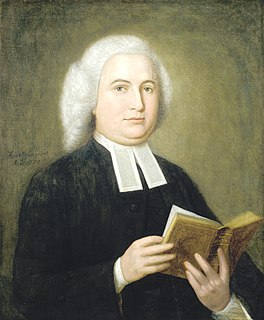 W
WJames Manning was an American Baptist minister, educator and legislator from Providence, Rhode Island. He was the first president of Brown University and one of its most involved founders, and served as minister of the First Baptist Church in America.
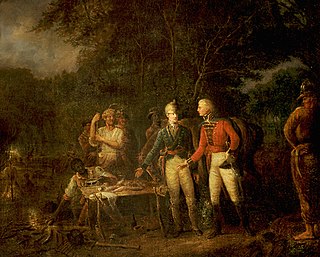 W
WOscar Marion was an American slave and Revolutionary War militiaman.
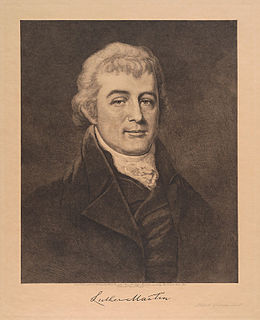 W
WLuther Martin was a politician and one of the Founding Fathers of the United States, who left the Constitutional Convention early because he felt the Constitution violated states' rights. He was a leading Anti-Federalist, along with Patrick Henry and George Mason, whose actions helped passage of the Bill of Rights.
 W
WFilippo Mazzei was an Italian physician, winemaker, and arms dealer. A close friend of Thomas Jefferson, Mazzei acted as an agent to purchase arms for Virginia during the American Revolutionary War.
 W
WThomas Melvill or Thomas Melville was a merchant, member of the Sons of Liberty, participant in the Boston Tea Party, a major in the American Revolutionary War, a longtime fireman in the Boston Fire Department, state legislator, and paternal grandfather of writer Herman Melville.
 W
WJohn Morton was a farmer, surveyor, and jurist from the Province of Pennsylvania and a Founding Father of the United States. As a delegate to the Continental Congress during the American Revolution, he was a signatory to the Continental Association and the United States Declaration of Independence. Morton provided the swing vote that allowed Pennsylvania to vote in favor of the United States Declaration of Independence. Morton chaired the committee that wrote the Articles of Confederation.
 W
WStephen Olney was a soldier in the Continental Army during the American Revolutionary War and later a Rhode Island legislator.
 W
WJames Otis Jr. was an American lawyer, political activist, pamphleteer, and legislator in Boston, a member of the Massachusetts provincial assembly, and an early advocate of the Patriot views against the policy of Parliament which led to the American Revolution. His well-known catchphrase "Taxation without Representation is tyranny" became the basic Patriot position.
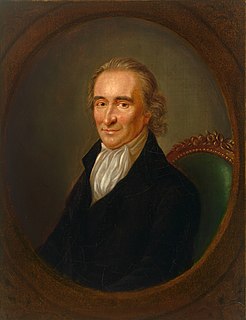 W
WThomas Paine was an English-born American political activist, philosopher, political theorist, and revolutionary. He authored Common Sense (1776) and The American Crisis (1776–1783), the two most influential pamphlets at the start of the American Revolution, and helped inspire the patriots in 1776 to declare independence from Great Britain. His ideas reflected Enlightenment-era ideals of transnational human rights.
 W
WPatriots, also known as Revolutionaries, Continentals, Rebels, or American Whigs, were the colonists of the Thirteen Colonies who rejected British rule during the American Revolution, and declared the United States of America an independent nation in July 1776. Their decision was based on the political philosophy of republicanism—as expressed by such spokesmen as Thomas Jefferson, John Adams, and Thomas Paine. They were opposed by the Loyalists, who supported continued British rule.
 W
WPaul Revere was an American silversmith, engraver, early industrialist, and Patriot in the American Revolution. He is best known for his midnight ride to alert the colonial militia in April 1775 to the approach of British forces before the battles of Lexington and Concord, as dramatized in Henry Wadsworth Longfellow's poem, "Paul Revere's Ride" (1861).
 W
WJohn Rhea was an American soldier and politician of the early 19th century who represented Tennessee in the United States House of Representatives. Rhea County, Tennessee and Rheatown, a community and former city in Greene County, Tennessee is named for him.
 W
WEdward Roche was an American merchant who served in both houses of the Delaware General Assembly, as a delegate to the Delaware state constitutional convention, and in the American Revolutionary War.
 W
WThe Sons of Liberty was a loosely organized clandestine political organization active in the Thirteen American Colonies founded to advance the rights of the colonists and to fight taxation by the British government. It played a major role in most colonies in battling the Stamp Act in 1765. The group disbanded after the Stamp Act was repealed. However, the name was applied to other local separatist groups during the years preceding the American Revolution.
 W
WDr. Samuel Stillman (1737–1807) was an American Baptist minister. Born in Philadelphia, Pennsylvania and raised in South Carolina, he married Hannah Morgan and took a pastorate in South Carolina for several years.
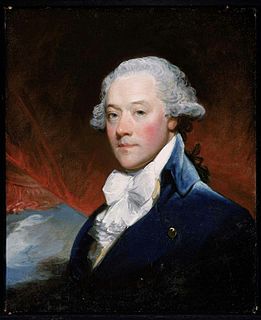 W
WJames Swan was a colorful personality based in Boston in the 18th and 19th centuries. He was a member of the Sons of Liberty and participated in the Boston Tea Party. Swan was twice wounded at the Battle of Bunker Hill, he next became secretary of the Massachusetts Board of War and the legislature. During the time he held that office, he drew heavily on his private funds to aid the Continental Army, which was then in dire need of funds to arm and equip the soldiers who were arriving in Boston from all parts of New England. After the American Revolution Swan privately assumed the entire United States French debts at a slightly higher interest rate. Swan then resold these debts at a profit on domestic U.S. markets. The United States no longer owed money to foreign governments, although it continued to owe money to private investors both in the United States and in Europe. This allowed the young United States to place itself on a sound financial footing. On principles of loyalty, he spent 22 years—more than a quarter of his life—in the Paris Sainte-Pélagie Prison.
 W
WCharles Thomson was an Irish-born Patriot leader in Philadelphia during the American Revolution, and the secretary of the Continental Congress (1774–1789) throughout its existence.
 W
WWilliam Vernon, of Newport, Rhode Island, was a New England trader who played a leading role in the Continental Congress' maritime activities during the American Revolution. As president of the Eastern Navy Board during the Revolution, he was responsible for building and outfitting the ships of the Continental Navy.
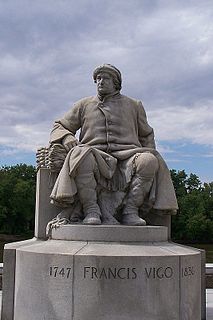 W
WFrancis Vigo born Giuseppe Maria Francesco Vigo was an Italian-American who aided the American forces during the Revolutionary War and helped found a public university in Vincennes, Indiana, USA.
 W
WThomas Westbrook Waldron was a prominent political figure in Dover, New Hampshire and a military officer that fought in the Siege of Louisbourg (1745). He later became a commissioner at Albany, New York and then a Royal councillor in 1782. During the American Revolution, Waldron abandoned his loyalist friend, New Hampshire Governor John Wentworth (governor) to become a patriot of the United States.
 W
WSamuel Ward was an American farmer, politician, Supreme Court Justice, Governor of the Colony of Rhode Island and Providence Plantations, and delegate to the Continental Congress. He was the son of Rhode Island governor Richard Ward, was well-educated, and grew up in a large Newport, Rhode Island family. After marrying, he and his wife received property in Westerly, Rhode Island from his father-in-law, and the couple settled there and took up farming. He entered politics as a young man and soon took sides in the hard-money vs. paper-money controversy, favoring hard money or specie. His primary rival over the money issue was Providence politician Stephen Hopkins, and the two men became bitter rivals—and the two also alternated as governors of the Colony for several terms.
 W
WCol. Samuel Ward Jr. was an American Revolutionary War soldier, politician, and delegate to the secessionist Hartford Convention.
 W
WThomas Wharton Jr. was a Pennsylvania merchant and politician of the Revolutionary era. He served as the first President of Pennsylvania following the Declaration of Independence from Great Britain and he started the history of the United States of America.
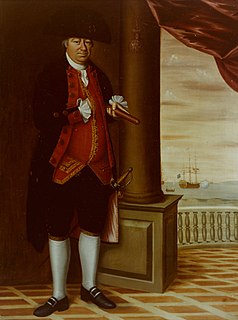 W
WAbraham Whipple was an American Revolutionary War commander in the Continental Navy, and later one of the founders of Marietta, Ohio. Born near Providence, Colony of Rhode Island, Whipple chose to be a seafarer early in his life and embarked on a career in the lucrative West Indies trade, working for Moses and John Brown. In the French and Indian War period, he became a privateersman and commanded privateer Game Cock from 1759 to 1760. In one six-month cruise, he captured 23 French ships.